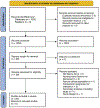Factors Associated with Potentially Harmful Medication Prescribing in Nursing Homes: A Scoping Review
- PMID: 35868350
- PMCID: PMC10101239
- DOI: 10.1016/j.jamda.2022.06.008
Factors Associated with Potentially Harmful Medication Prescribing in Nursing Homes: A Scoping Review
Abstract
Objectives: To summarize current evidence regarding facility and prescriber characteristics associated with potentially harmful medication (PHM) use by residents in nursing homes (NHs), which could inform the development of interventions to reduce this potentially harmful practice.
Design: Scoping review.
Setting and participants: Studies conducted in the United States that described facility and prescriber factors associated with PHM use in NHs.
Methods: Electronic searches of PubMed/MEDLINE were conducted for articles published in English between April 2011 and November 2021. PHMs were defined based on the Beers List criteria. Studies testing focused interventions targeting PHM prescribing or deprescribing were excluded. Studies were characterized by the strengths and weaknesses of the analytic approach and generalizability.
Results: Systematic search yielded 1253 articles. Of these, 29 were assessed in full text and 20 met inclusion criteria. Sixteen examined antipsychotic medication (APM) use, 2 anticholinergic medications, 1 sedative-hypnotics, and 2 overall PHM use. APM use was most commonly associated with facilities with a higher proportion of male patients, younger patients, and patients with severe cognitive impairment, anxiety, depression, and aggressive behavior. The use of APM and anticholinergic medications was associated with low registered nurse staffing ratios and for-profit facility status. No studies evaluated prescriber characteristics.
Conclusions and implications: Included studies primarily examined APM use. The most commonly reported facility characteristics were consistent with previously reported indicators of poor NH quality and NHs with patient case mix more likely to use PHMs.
Keywords: Potentially harmful medications; antipsychotics; nursing homes; prescribing.
Copyright © 2022 AMDA – The Society for Post-Acute and Long-Term Care Medicine. Published by Elsevier Inc. All rights reserved.
Conflict of interest statement
The authors declare no conflicts of interest.
Similar articles
-
Potentially Harmful Medication Prescribing by the Degree of Physician Specialization in Nursing Home Practice: An Observational Study.J Am Med Dir Assoc. 2023 Aug;24(8):1240-1246.e2. doi: 10.1016/j.jamda.2023.03.017. Epub 2023 Apr 20. J Am Med Dir Assoc. 2023. PMID: 37088104 Free PMC article.
-
Burden of Potentially Harmful Medications and the Association With Quality of Life and Mortality Among Institutionalized Older People.J Am Med Dir Assoc. 2016 Mar 1;17(3):276.e9-14. doi: 10.1016/j.jamda.2015.12.011. Epub 2016 Jan 21. J Am Med Dir Assoc. 2016. PMID: 26805751
-
An observational study of antipsychotic medication use among long-stay nursing home residents without qualifying diagnoses.J Psychiatr Ment Health Nurs. 2018 Oct;25(8):463-474. doi: 10.1111/jpm.12488. Epub 2018 Aug 2. J Psychiatr Ment Health Nurs. 2018. PMID: 29911331
-
Health Outcomes of Deprescribing Interventions Among Older Residents in Nursing Homes: A Systematic Review and Meta-analysis.J Am Med Dir Assoc. 2019 Mar;20(3):362-372.e11. doi: 10.1016/j.jamda.2018.10.026. Epub 2018 Dec 21. J Am Med Dir Assoc. 2019. PMID: 30581126
-
Deprescribing research in nursing home residents using routinely collected healthcare data: a conceptual framework.BMC Geriatr. 2023 Aug 4;23(1):469. doi: 10.1186/s12877-023-04194-5. BMC Geriatr. 2023. PMID: 37542226 Free PMC article. Review.
Cited by
-
Facility-Level Differences in Antipsychotic Drug Use: Impact on Quality Outcomes for Nursing Home Residents.Med Care. 2025 Mar 1;63(3):202-210. doi: 10.1097/MLR.0000000000002111. Epub 2024 Dec 27. Med Care. 2025. PMID: 39739598
-
Associations between specialized dementia care, COVID-19 and central nervous system medication use in assisted living: a population-based repeated cross-sectional study.BMC Geriatr. 2024 Aug 14;24(1):684. doi: 10.1186/s12877-024-05274-w. BMC Geriatr. 2024. PMID: 39143530 Free PMC article.
-
Potentially Harmful Medication Prescribing by the Degree of Physician Specialization in Nursing Home Practice: An Observational Study.J Am Med Dir Assoc. 2023 Aug;24(8):1240-1246.e2. doi: 10.1016/j.jamda.2023.03.017. Epub 2023 Apr 20. J Am Med Dir Assoc. 2023. PMID: 37088104 Free PMC article.
-
A model to increase care delivery in nursing homes: The role of Institutional Special Needs Plans.Health Serv Res. 2025 Apr;60(2):e14390. doi: 10.1111/1475-6773.14390. Epub 2024 Oct 9. Health Serv Res. 2025. PMID: 39383891
-
Evaluation of real-world evidence to assess health outcomes related to deprescribing medications in older adults: an International Society for Pharmacoepidemiology-endorsed systematic review of methodology.Am J Epidemiol. 2025 Aug 5;194(8):2431-2439. doi: 10.1093/aje/kwae425. Am J Epidemiol. 2025. PMID: 39572376 Free PMC article.
References
-
- Ailabouni N, Mangin D, Nishtala PS. DEFEAT-polypharmacy: deprescribing anticholinergic and sedative medicines feasibility trial in residential aged care facilities. Int J Clin Pharm. 2019;41:167–178. - PubMed
-
- Bayliss EA, Shetterly SM, Drace ML, et al. The OPTIMIZE patient- and family-centered, primary care-based deprescribing intervention for older adults with dementia or mild cognitive impairment and multiple chronic conditions: study protocol for a pragmatic cluster randomized controlled trial. Trials. 2020;21:542. - PMC - PubMed
-
- Fralick M, Bartsch E, Ritchie CS, Sacks CA. Estimating the use of potentially inappropriate medications among older adults in the United States. J Am Geriatr Soc. 2020;68:2927–2930. - PubMed
-
- Beers MH. Explicit criteria for determining potentially inappropriate medication use by the elderly. An update. Arch Intern Med. 1997;157:1531–1536. - PubMed
Publication types
MeSH terms
Substances
Grants and funding
LinkOut - more resources
Full Text Sources
Medical
Miscellaneous


